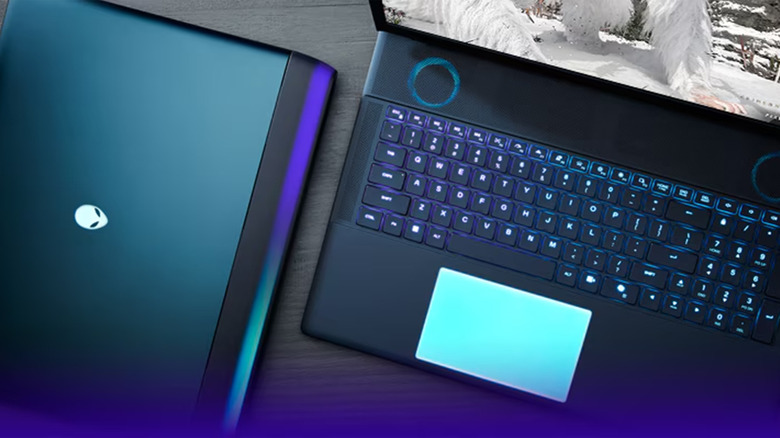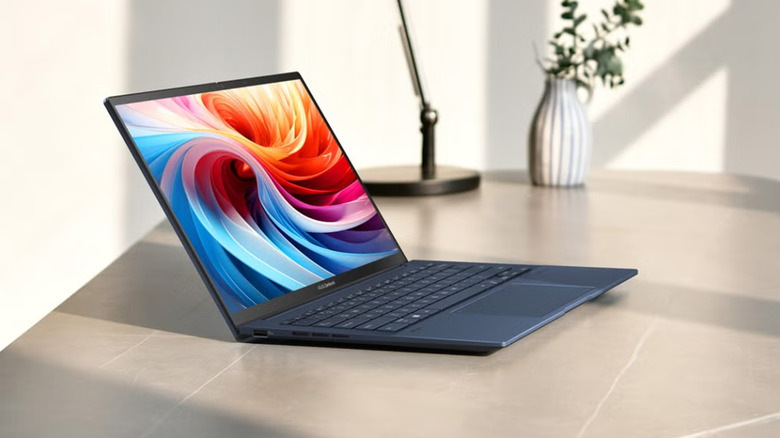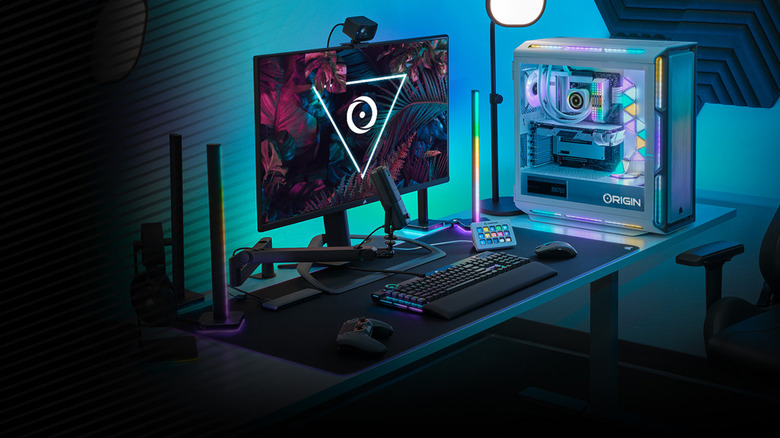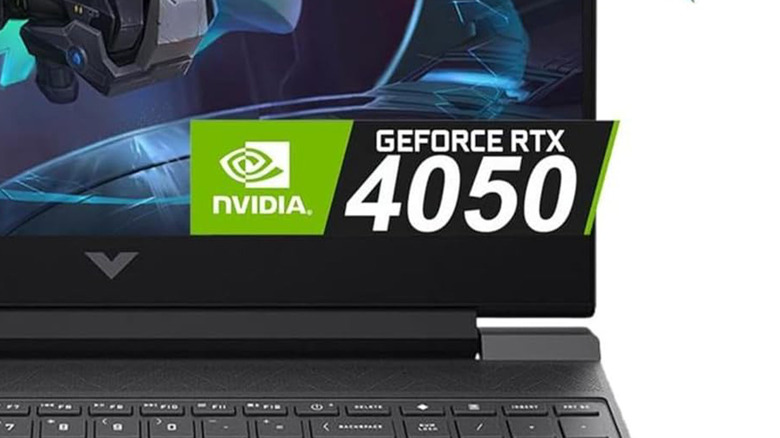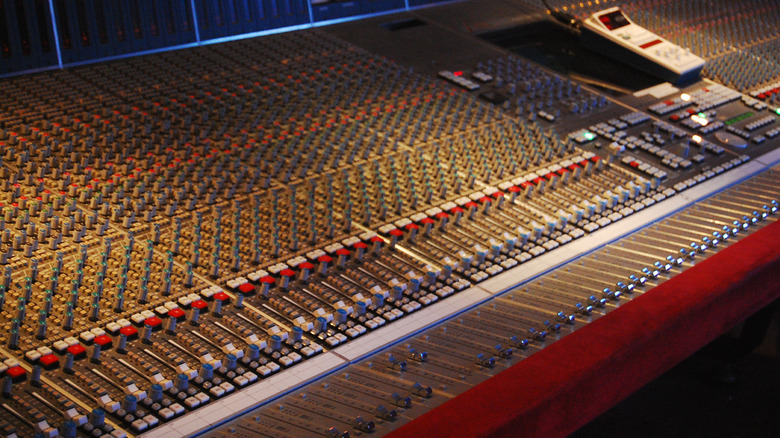5 Things To Consider When Buying A New Computer, Ranked By Importance
We may receive a commission on purchases made from links.
A new computer is a major purchase. It can be among the most expensive electronics that money can buy, potentially functioning as the center of your media, gaming, and productivity setup for the next half decade at least. That's quite a long time. If you are 18 years old and fresh out of high school, your next computer purchase will likely last you for your entire college career. Thus, it is important to take a while to sit and really think about what you want to buy.
There are a ton of different ways you can go. Many people enjoy the portability and utility of a laptop, while others prefer to have a static workstation like you get with a desktop. Many don't mind spending extra to get the best specs, while others are perfectly fine with the cheapest Chromebook that can do the job. With such a large variety, it makes sense to have analysis paralysis when it comes to purchasing a new PC.
It's almost impossible to gainfully recommend something to a total stranger, since everyone's needs are different. So, instead of recommending a specific machine, let's go through a list of questions you should ask yourself before you pull the trigger on a new purchase. These are things that many people think about anyway, but it doesn't hurt to go over it once more to really make sure that you're picking the right item since you'll likely be stuck with it for a long time.
Consider your intentions
This is arguably the single most important thing to think about when shopping for a new computer: What is your computer actually going to be doing? Virtually everything on the market today is suitable for basic stuff like web browsing, streaming video, answering emails, and things like that. Some folks even do this on their tablets or smartphones more than their computers.
Once you get into more specialized uses, you have to look for more specific things. For example, gamers shopping for a laptop will want to make sure that it has a dedicated graphics card that can run the games they want to play. Productivity uses like 3D modeling and video editing will also perform better with dedicated graphics for hardware acceleration and more RAM to run the software better. Any productivity use will be improved with a more powerful CPU.
You can easily and quickly remove contenders from the race based on your individual use case. If you intend to use your machine for more complex work, you can pretty much eliminate budget computers from consideration. Those who game can immediately remove any laptop or desktop without a dedicated graphics card. It's also worth checking what software you intend to use. If it doesn't work on a MacBook, for example, then you obviously won't be buying a MacBook.
Laptop or desktop?
Now that you've narrowed down what you're going to use, the next question is where do you want to use it? There are a lot of pros and cons to picking a laptop over a desktop or vice versa. Laptops are infinitely more portable, but tend to be less powerful, have less efficient cooling, and cost more for the specs that you get. Desktops don't move, but they're more powerful, they have better cooling, and with a little shopping around, they're usually cheaper than comparable laptops, especially if you build your own computer. Laptops also have all of their peripherals built in whereas desktops require separate purchases for everything.
Whether or not a laptop or a desktop is the better choice varies wildly by use case. For many college students, a laptop is arguably better, as you can carry it around to classes and also take it home during spring, winter, and summer breaks. Dorms are also fairly small, and laptops take up less space. For us older folks, a desktop may be the way to go, as you likely have more space and fewer places to take your PC, unless you travel for work.
This is another question only you can answer. However, whether or not you will (or will want to) take your laptop with you will definitely factor into what you buy. After all, some college students build desktop PCs and take a tablet to lectures to record and take notes. It all depends on what you have and what you want to do.
How much do you want to spend?
Budget is always a huge consideration when buying or building a computer. In fact, as a casual browser of the Build A PC subreddit, it's one of the things I see most often discussed. Typically, you'll want to get the best possible machine in your price range, but the best is largely determined by what you need rather than what's on the spec sheet. When it comes to budget, the question isn't necessarily what you can get for the price, but rather what you can live without, should your budget not encapsulate everything you want.
In practice, this is just being honest about what you need versus what you want. For instance, as part of my writing job, I often take photos, so color accuracy on my display is very important, so my photos don't look bad. Per-key RGB keyboards, on the other hand, are a luxury that I want, but don't necessarily need. Thus, if my budget could only include one of those things, I would take the superior display and a more basic backlit keyboard.
This works with specifications as well. If you use a computer for work but also play a few simple games, you can probably get away with a lower-tier graphics card in favor of a stronger CPU for your work. Of course, none of this matters if price is no object and at that point, you should probably just get the one you like most.
Make sure the tech isn't outdated or underpowered
As the resident tech nerd in my friend circle, my friends often ask me what they should buy and even send me links. Because a lot of this stuff isn't well understood outside of the tech sphere, it's very easy to get fooled into buying an underpowered or outdated laptop through marketing or bad advice on the Internet. It is vital to look at the specs of any machine to make sure that it'll work for what you need.
A good example of this is the Apple MacBook. Generally speaking, it's decent advice to avoid buying the base model version. Since MacBooks aren't user-upgradeable, you're stuck with the specs you buy at purchase. For the base models, the M4 MacBook Pro starts with 24GB of unified RAM and 512GB of storage. The RAM is good, but 512GB of storage doesn't go as far as it used to, especially if you work with a lot of files for academia or professionally. The M4 MacBook Air is actually worse, with 16GB of unified RAM and a scant 256GB of storage.
Both of those laptops are more than powerful enough to last you for many years. However, that isn't a lot of storage to work with, which may cause stress later on. Earlier models of the Air had only 8GB of RAM at launch, and people who bought those variants are currently reaping the detriments of that decision. In short, spend now on the upgrade so you don't spend later fixing your mistake.
Compatibility with existing hardware
Generally speaking, compatibility concerns with peripherals is a thing of the past — basically everything uses USB-A or USB-C. However, some pieces of older equipment still use things like FireWire, and since no PC comes with that port anymore, you'll want to make sure you have an adapter of some sort to handle it (provided it's something you need). Amazon is a great spot for adapters and you should be able to find whatever kind you need there. For example, I once bought a USB-to-ethernet adapter for an old MacBook a job provided me once.
The bigger issue is making sure you have enough ports for your peripherals. For desktops, this is reasonably easy, as they typically have a bunch on the front and back. Conversely, the number of available ports on modern laptops has been getting smaller and smaller every year. This has been countered by an increase in the number of USB hubs and USB docks available for purchase. These helpful items plug into a USB port and give you more USB ports, allowing you to plug in gaming keyboards and the mouse of your choosing without using up all your available space.
Now, this consideration isn't nearly as important as the other things on this list. However, if you plan on bringing specific accessories or hardware with you to your new computer, be it a laptop or a desktop, it represents a potential added cost you should bear in mind.
